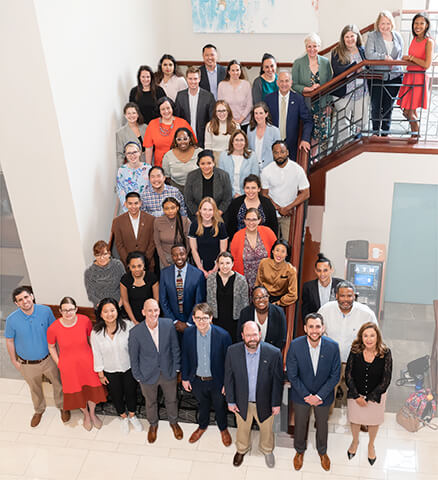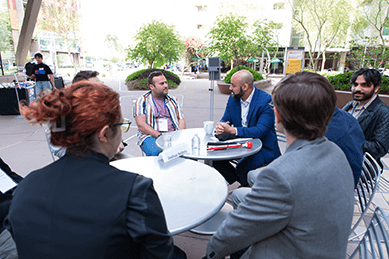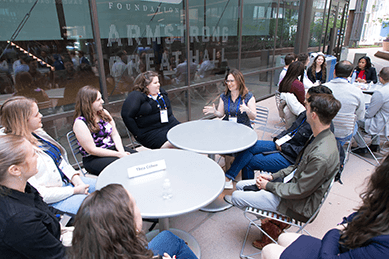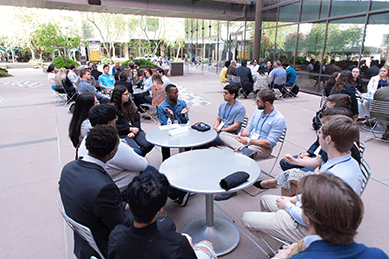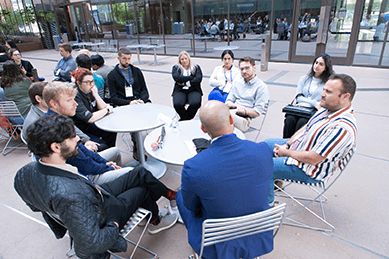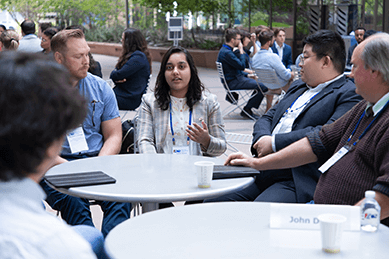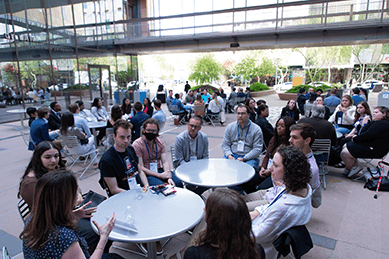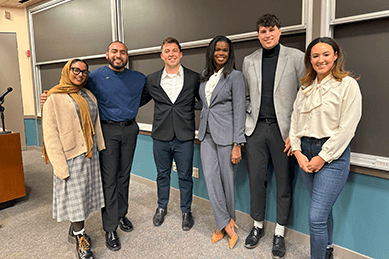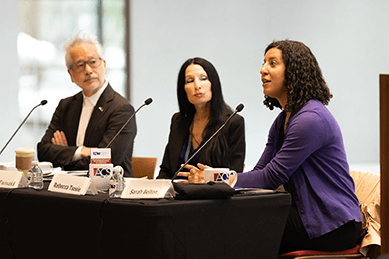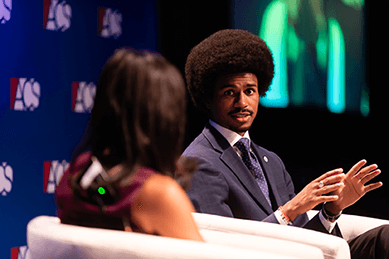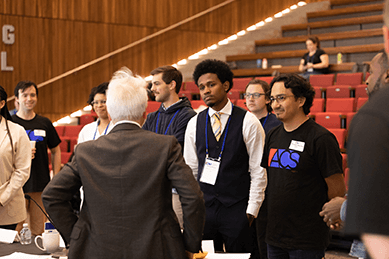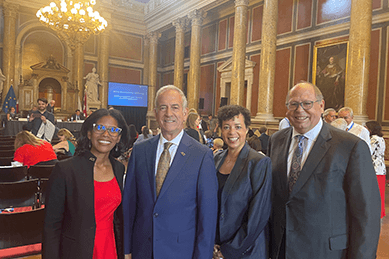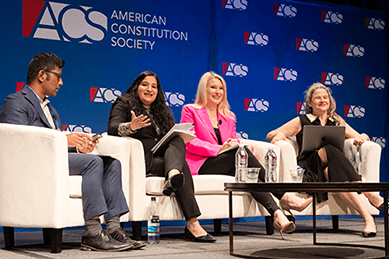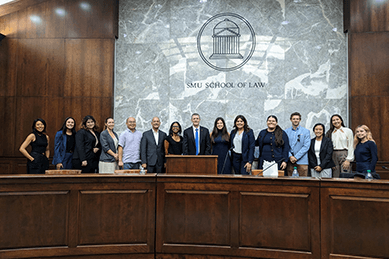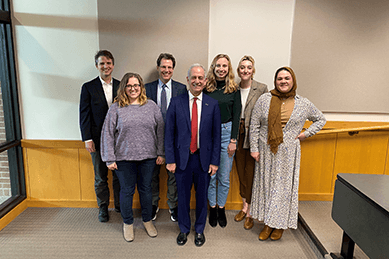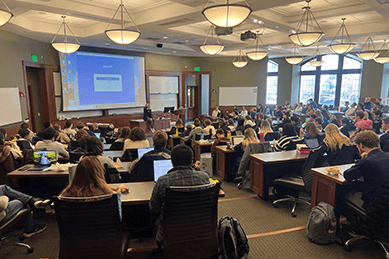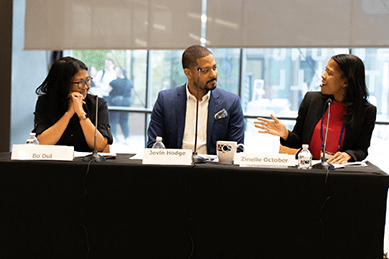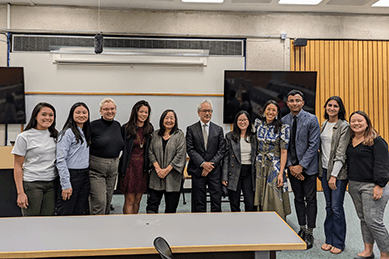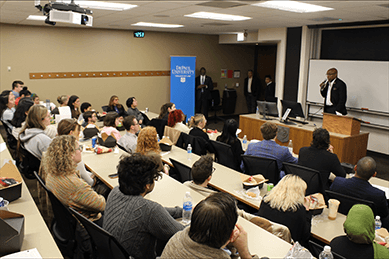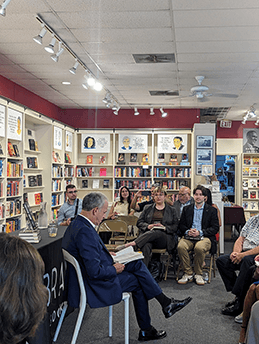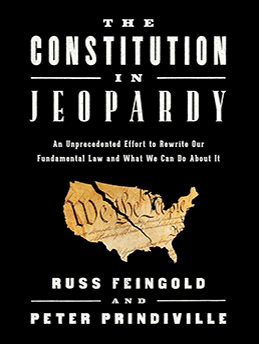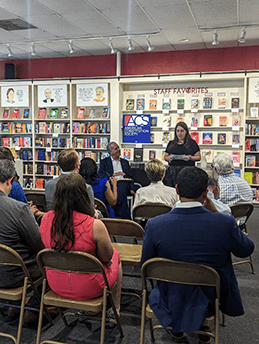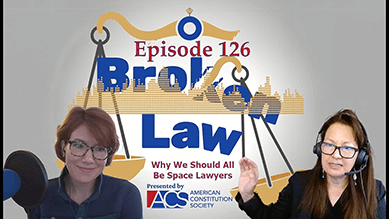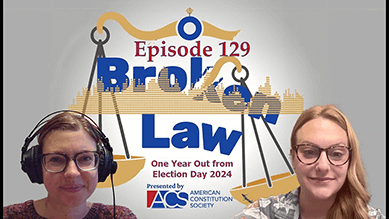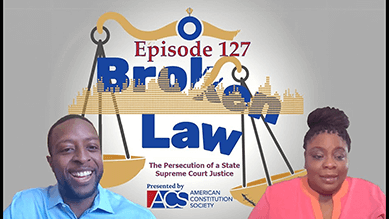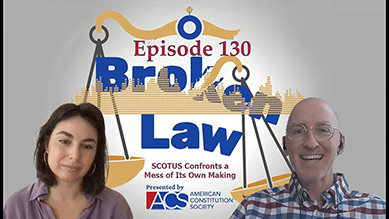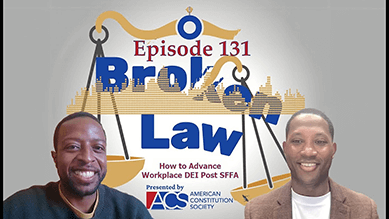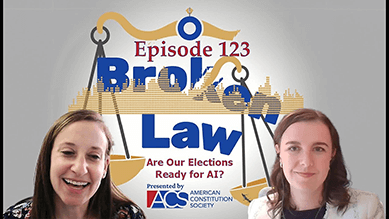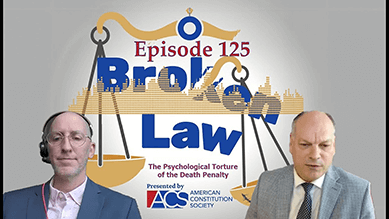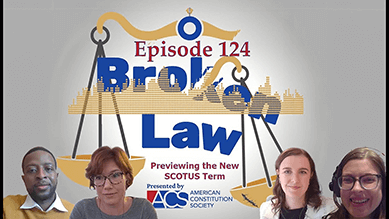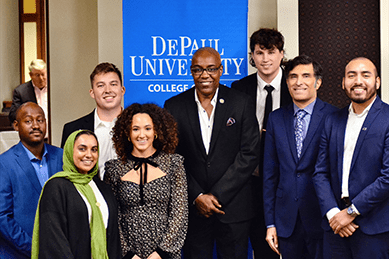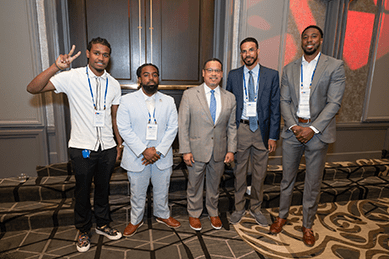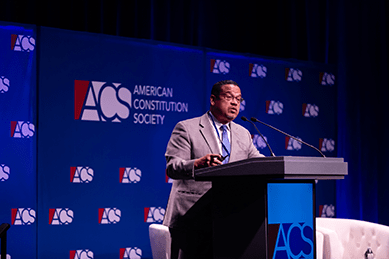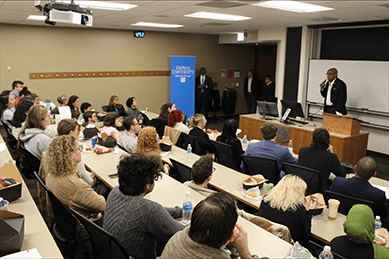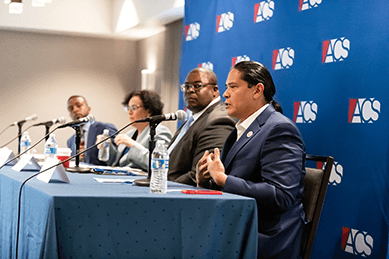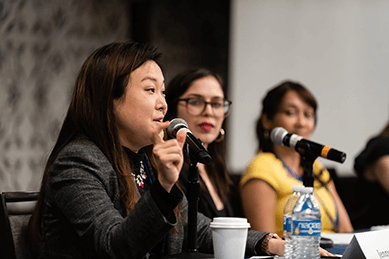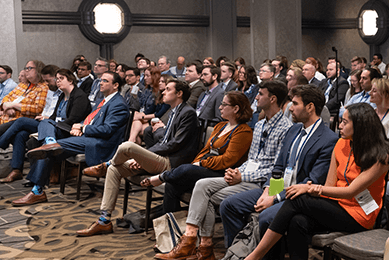2023: A Year in Review
TABLE OF CONTENTS
- Securing the Promise of a Multiracial Democracy and Defeating Authoritarianism
- Our Unique Strength
- In Pursuit of a Multiracial Judiciary
- Diversifying the Federal Bench
- Mobilizing Around State Courts
- Navigating the Clerkship Process
- Expanding Public Data about the Federal Courts
- Shaping the Debate on Pressing Legal Issues
- Sounding the Alarm About a Constitutional Convention
- In Pursuit of Death Penalty Abolition
- Advancing Truth, Racial Healing & Transformation
- The Promise of the Equal Rights Amendment as the 28th Amendment
- Promoting Supreme Court Reform
- Standing with Workers
- Keeping Church and State Separate
- ACS’s Signature Podcast "Broken Law"
- State Attorneys General Project
- Run.Vote.Work. Initiative
- Our Nationwide Network and Chapters
Securing the Promise of a Multiracial Democracy and Defeating Authoritarianism
The past year underscored the mounting threat of authoritarianism in the United States with judges disregarding the rule of law, state legislatures passing bills to restrict our fundamental freedoms, and the enduring threat of election subversion. What binds these threats together? Undermining the rule of law. That’s why the American Constitution Society (ACS), the nation’s foremost progressive legal organization, has never been more important than it is today.ACS was founded in 2001 in response to the Supreme Court’s decision in Bush v. Gore, which demonstrated the conservative legal movement’s mounting influence in shaping the ideology of our federal courts, including our highest court. Over the past 22 years, ACS has become the backbone of the progressive legal movement, serving as its convener, idea incubator, and mobilizer, and building the nationwide legal infrastructure needed to counter the far-Right’s influence on our courts, our laws, and our legal systems. This year, ACS focused its work on securing the promise of a multiracial democracy and defeating authoritarianism.
ACS’s vision is of a multiracial, representative democracy that includes:
- A judiciary that reflects the diversity of the public it serves, interprets the U.S. Constitution through the backdrop of history and through the lens of lived experience, and protects democratic guardrails, upholds the rule of law, and vindicates fundamental rights;
- Democratic institutions that advance equity and justice, uphold the rule of law, and guard against the abuse of power; and
- A robust and diverse legal civil society that actively promotes progressive legal transformation and redresses the founding failures of our Constitution and of our laws and legal systems.
Our Unique Strength
Unique to ACS are our nearly 200 student and lawyer chapters across the country and our nationwide network of 40,000 lawyers, students, judges, scholars, elected officials, and advocates. ACS members sit on state supreme courts and serve in State Houses. They are serving the country at every level of the federal government, including the federal judiciary, and leading the nation’s foremost progressive non-profits. They are members of state and federal bars, including the U.S. Supreme Court Bar, and are partners and associates at law firms big and small throughout the nation. Our impact comes from the diversity and breadth of our members’ experiences and expertise, brought together by ACS to empower the progressive legal movement.
In Pursuit of a Multiracial Judiciary
To have a multiracial democracy, we need a multiracial judiciary that reflects the diversity of the American public. Throughout our country’s history, our judiciary has been and remains dominated by white men, most often with a background in prosecution or Big Law. As of December 31, 2023, the judges in our federal judiciary were still nearly 67 percent white.
ACS and its nationwide network of legal professionals, who represent the rich diversity of this country, are on the frontlines of helping to diversify the bench and ensure our courts uphold the rule of law, vindicate our fundamental freedoms, and safeguard our democracy.
Diversifying the Federal Bench
Through our Path to the Bench initiative, ACS is committed to helping the Biden-Harris administration diversify the federal bench and fill as many federal court vacancies as possible before the end of 2024. Building on two decades of grassroots investment in our network, ACS has built 55 working groups in 42 states to identify, recruit, and recommend diverse, qualified candidates for the federal bench. At the end of his third year, President Biden had appointed 166 federal judges; one-third of them were identified and recommended by ACS’s Path to the Bench working groups or are otherwise affiliated with ACS. We understand the President specifically takes note of which candidates have been recommended by ACS as he considers whom to nominate. We are proud to play this critical role in diversifying the federal bench.
Central to our efforts is ensuring that our working groups prioritize racial, ethnic, gender, sexual orientation, and practice area diversity. Our working groups have recruited and recommended numerous candidates who had not thought of themselves as candidates for the bench prior to being approached by ACS. Our working groups also provide candidates with guidance and support throughout the process, in conjunction with the ACS national staff, to demystify the judicial nominations process and successfully move candidates toward consideration.
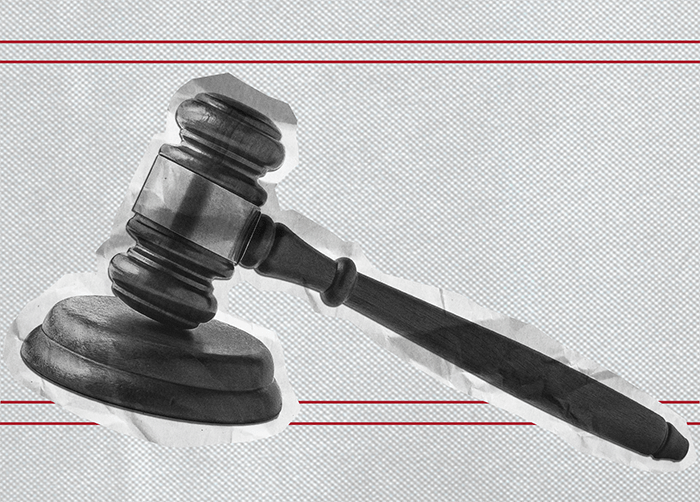
ACS’s investment in its Path to the Bench initiative and close coordination with the White House and with Senators have helped President Biden make historic strides in diversifying the federal bench. Of President Biden’s 166 confirmed judges at the end of three years, more than 65 percent are women, and more than 66 percent are people of color. Even so, we know the work to achieve a federal judiciary that reflects the diversity of the public it serves is far from over, which is why ACS was relentless throughout 2023 in calling on the U.S. Senate to better prioritize judicial confirmations.
Equipped with its data, ACS was arguably the most outspoken organization in 2023 in warning about the Senate’s reduced pace in confirmations, the risk of President Biden falling behind his predecessor on appointments, sounding the alarm when the President did fall behind, and calling on the Senate ever since to reprioritize confirmations. ACS used every tool in its toolbox to galvanize Senators around confirmations, hosting podcast episodes and giving press interviews, writing op-eds and having regular calls with the White House and Senate offices. ACS ended 2023 by looking to 2024 and stressing the urgency of maximizing confirmations before the end of President Biden’s first term and identifying steps the Senate should take to achieve this, including ending the blue slip tradition and expanding the Senate calendar. As we’ve seen from lower court decisions with nationwide implications handed down by extreme right-wing judges, each missed opportunity to fill a vacancy on the bench puts our fundamental rights and the rule of law at risk.
Mobilizing Around State Courts
Building on the progress made in 2022, ACS expanded its state court work from 8 states in 2022 to 15 states in 2023. In these states, ACS has built a robust infrastructure focused on identifying, recruiting, and recommending state court candidates and mobilizing around state court elections. As with our Path to the Bench initiative, our state court work is focused on diversifying state judiciaries with judges who reflect the communities they serve, bring professional diversity to the bench, and are committed to upholding the rule of law, vindicating our fundamental freedoms, and safeguarding democracy.Wisconsin is an excellent example of ACS’s investment and success in building a legal infrastructure focused on state courts. As a result of our engagement over the past few years, ACS members now make up nearly half of the Governor’s Judicial Selection Advisory Committee. Additionally, our chapters and members helped educate and mobilize voters ahead of this year’s consequential Wisconsin Supreme Court election in April. With the Wisconsin Supreme Court slated at the time to hear cases about the state’s pre-Civil War abortion ban and gerrymandered legislative maps, the election was rightfully pitched as outcome determinative on several key issues.
| "State courts are increasingly on the frontlines of vindicating our fundamental freedoms and safeguarding our democracy. This is why ACS spent 2023 expanding its work on state courts, including by encouraging our members to join judicial nominating commissions and by educating voters about the sweeping impact of state court elections." — Zinelle October, ACS Executive Vice President |
Another example of ACS’s impact at the state level is the progress we made this year in Minnesota. Our lawyer chapter in the capital has developed a robust process for making recommendations for and regularly meets with state officials about state court appointments. This year, Governor Tim Walz appointed Karl Procaccini, a long time ACS member and former lawyer chapter leader and ACS Next Generation Leader, to serve as associate justice on the Minnesota Supreme Court.
This year, in courthouses and statehouses throughout the country, a worrying trend emerged. Elected officials supported by the conservative legal movement abused their power to launch illegitimate attacks on judges. The attacks against North Carolina Supreme Court Justice Anita Earls and Wisconsin Supreme Court Justice Janet Protasiewicz are two high-profile examples of this trend, which is largely targeting women and Black judges and designed to undermine judicial independence. ACS activated its network to help counter specific attacks and sound the alarm about the trend more broadly. In addition to hosting a virtual program and a podcast episode, ACS helped rally validators to defend judicial independence and call out the racism and sexism in these attacks. ACS’s work to counter this emerging threat is ongoing.
Navigating the Clerkship Process
 Tomorrow’s judges will predominantly come from today’s law clerks. This is why we have invested in our clerkship assistance program and consider it an extension of our Path to the Bench initiative. We help diverse students with a commitment to public service connect with judges, mentors, and clerkship opportunities. And in 2023, we helped more students through our clerkship assistance program than ever before.
Tomorrow’s judges will predominantly come from today’s law clerks. This is why we have invested in our clerkship assistance program and consider it an extension of our Path to the Bench initiative. We help diverse students with a commitment to public service connect with judges, mentors, and clerkship opportunities. And in 2023, we helped more students through our clerkship assistance program than ever before.
This year, we selected 40 outstanding applicants to be part of our clerkship assistance cohort, who all received coaching on strategy and the clerkship application itself; connections with former clerks and others who know judges; and direct recommendations to judges in our network. Our goal with this program is to get these diverse, qualified candidates off the pile of hundreds of thousands of applications. Just as our Path to the Bench initiative is focused on diversifying the federal bench, we are committed to increasing the diversity of judicial law clerks, as only 21 percent of federal law clerks today are people of color. In comparison, more than 63 percent of our clerkship assistance cohort are people of color, 43 percent are immigrants or children of immigrants, and 25 percent are members of the LGTBQ+ community.
In 2023, we also expanded our mentor matching program to include 90 students, up from 40 in 2022. We held 114 one-on-one meetings with law students to provide individual advice and held two national programs with more than 1800 total attendees. We also created opportunities for students to meet judges at our 2023 Student Convention, 2023 National Convention, and at local chapters throughout the year. Further, we keep a list of lawyers willing to clerk for new judges or judges with an unexpected vacancy, another way we help in placing candidates with clerkship opportunities.
Expanding Public Data about the Federal Courts
Throughout 2023, ACS continued to track the federal judicial nominations process and the diversity of the federal bench, providing an essential data resource to our members, the public, and the media. Continuously updated, ACS’s website is an unmatched resource for understanding and tracking the federal judicial confirmation process, with real time data on the number of vacancies, judicial nominees pending before the Senate, and the status of those nominees in the confirmation process. Additionally, ACS provides detailed analysis of the evolving diversity of the federal bench, updating the data with each new confirmation. ACS’s judicial data is routinely cited by media outlets across the political spectrum, from The Washington Post to The Wall Street Journal.This year, ACS added a new data feature. For the first time, voters can now see how their U.S. Senators voted on each of President Biden’s appointed judges. Previously, a person interested in such data had to look up each roll call vote one by one on the Senate’s website. A tedious and time-consuming process to say the least. Now, a voter can look up their Senators on ACS’s website and quickly see how they have voted in total and by individual confirmed judge.
| ACS firmly believes in empowering its members and supporters to engage on the courts and that starts by ensuring our members are as informed as possible about the judicial nominations process and the current status of the federal bench. As we look ahead to next year’s election cycle, we hope our new data feature will help voters be informed on how their Senators voted on confirming President Biden’s diverse, qualified judicial nominees. |
Shaping the Debate on Pressing Legal Issues
Through a robust combination of programs, podcasts, publications, digital media, in-person events, and advocacy, which were anchored by ACS scholars, experts, staff, and movement lawyers, ACS continued to shape local and national debates on pressing legal challenges and developments in 2023. ACS and its chapters hosted nearly 1,000 programs, 54 podcast episodes, and several convenings on urgent and emerging issues. These resources provide non-partisan educational tools and strategies for key policymakers, our nationwide network, and the public, who utilize them to mobilize in their respective communities. Throughout the year, ACS used all its tools and platforms to sustain an overarching focus on securing the promise of a multiracial democracy and defeating authoritarianism.
Sounding the Alarm About a Constitutional Convention
Throughout 2023, ACS sounded the alarm about how factions of the far-Right are conducting a well-funded national campaign aimed at radically rewriting the U.S. Constitution via an Article V Convention. ACS and its chapters hosted programs and podcast episodes, and engaged the media and stakeholders about this rising threat to our constitutional democracy.As part of its advocacy against an Article V Convention, ACS spoke out in advance of and in response to the far-Right organization Convention of States’ August “simulation,” which was used to train members on how to maximize a potential Article V Convention for partisan gain. ACS’s engagement included a hard-hitting article by ACS President Russ Feingold in The Nation about why the threat of this movement needs to be taken seriously. Similarly, when the California legislature pursued a resolution calling for a constitutional convention on gun violence prevention, ACS again spoke out. ACS strongly supports gun violence prevention, but explained why a constitutional convention was counterproductive and even dangerous. Again, ACS President Russ Feingold authored a defining article on the topic, this time in The San Francisco Chronicle.
As part of ACS’s advocacy against an Article V Convention, ACS consistently references our founders’ expectation that the Constitution would be amended over time. We support a nationwide, inclusive conversation about constitutional amendment as part of our ongoing effort to address the founding failures of our Constitution. But the pursuit of an Article V Convention in the absence of such a nationwide dialogue is dangerous and risks sending our country into a constitutional crisis.
In Pursuit of Death Penalty Abolition
ACS is committed to the abolition of the death penalty in the United States. As a step towards this goal, ACS continued this year to advocate for President Biden to issue a blanket commutation of federal death row. We coordinated with coalition partners on messaging to key government stakeholders in order to increase political support for a blanket commutation. In addition, ACS deepened its collaboration with international stakeholders similarly committed to death penalty abolition. We partnered, for example, with the European Law Institute on a program about the U.S. death penalty and the ongoing effort to abolish it.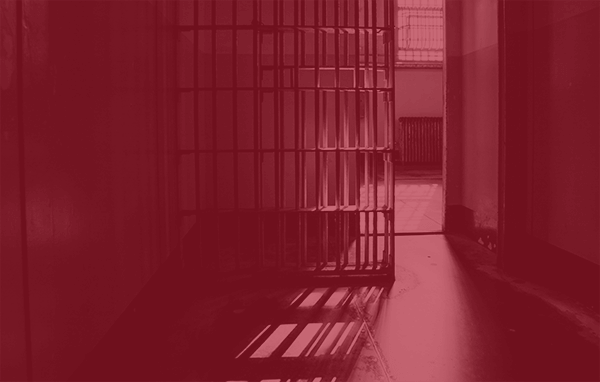
Advancing Truth, Racial Healing & Transformation
ACS is committed to reckoning with how our laws and legal systems, including the legal profession, have contributed to the perpetuation of racial inequity in this country. As part of this effort, ACS announced its support for Truth, Racial Healing, and Transformation (TRHT) in 2021 and has continued to invest in the effort since. This year, ACS and its chapters hosted over 20 programs related to TRHT, including reviewing discriminatory civil and criminal laws and the public policies that stem from them and a Student Convention program highlighting the work of the California Task Force to Study and Develop Reparations. We also monitored select Truth and Reparations Commissions around the country and have volunteers researching new commissions and tracking active commissions around the country for opportunities for public comment that we can share with the ACS network. As discussed below, our State Attorneys General Project also hosted a convening to advance TRHT through the work of state attorneys general and their offices.The Promise of the Equal Rights Amendment as the 28th Amendment
ACS is helping to lead the effort to realize the Equal Rights Amendment (ERA) as the 28th Amendment to the U.S. Constitution. The ERA is critical to addressing a founding failure of our Constitution – its silence on gender equality. Thirty-eight states have acknowledged this founding failure and ratified the ERA in accordance with Article V of the Constitution. ACS believes the ERA is part of the Constitution and should be treated as such.This year, we conducted direct outreach to elected officials, urging Congress to recognize the ERA as the 28th Amendment. ACS also met with policymakers from the White House and the U.S. Department of Justice to advocate for the ERA’s publication. In addition, ACS hosted podcast episodes and published articles about the critical importance of the ERA and why it should be published as the 28th Amendment. As people face mounting threats to their reproductive and bodily autonomy, the ERA is more important than ever.
Promoting Supreme Court Reform
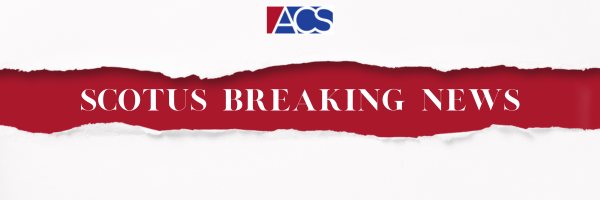
In 2023, ACS buttressed its advocacy in support of structural and non-structural Supreme Court reform with new features and further expertise to help its members understand the devastation being wrought by this packed and partisan Court. Toward the end of the Supreme Court’s 2022-23 term, ACS launched “SCOTUS Updates,” featuring rapid response emails sent to its members that broke down the Court’s biggest decisions after they were handed down. The emails helped ACS members understand the impact of key decisions and how the packed Supreme Court continues to defy precedent and judicial restraint and advance an extremist partisan agenda. These emails achieved an astounding 30 percent open rate, compared to the industry average of 2 or 3 percent. With the Court’s 2023-24 term underway, ACS is continuing its “SCOTUS Updates” in 2024 by providing members with readouts of the oral arguments in the Court’s biggest cases.
Following the conclusion of the Court’s 2022-2023 term, ACS hosted its annual National Supreme Court Review, during which some of the country’s most notable constitutional scholars and Supreme Court litigators broke down the term's key decisions and their impact going forward. ACS also solicited experts to write articles for its Expert Forum blog that combated the false narrative that the packed Court had moderated itself with decisions issued during the term. In advance of the new term, ACS hosted its annual National Supreme Court Preview, during which experts explained some of the seminal cases the Court would hear in the coming months.
Throughout the year, ACS used all its platforms, from its Broken Law podcast to its Expert Forum blog to its engagement with the media to advocate for reforming the Supreme Court. Reform includes adding seats to redress the Right’s packing of the Court; ending life tenure in favor of term limits for justices; and non-structural reform to include ethics reform. In the wake of yet more reporting on the unethical behavior of certain justices, ACS focused at length in 2023 on the need for the Court to have a binding code of ethics, akin to every other federal court in the country. ACS President Russ Feingold also spoke out critically of the half-measures in the Court’s announced “Code of Conduct.” ACS is proud to be on the frontlines of shaping the debate about how we solve the Supreme Court’s legitimacy crisis.
Standing with Workers
This year, ACS promoted workers’ rights by bringing together innovative legal thinkers, spotlighting labor during our National Convention, and educating the public through our Broken Law podcast, national programs, Expert Forum blog, and chapter events. Moreover, ACS hired its first Director of Policy and Program for Economic Justice to increase the organization’s engagement and effectiveness on economic justice and labor issues. Over the course of the year, ACS and its chapters hosted many programs focusing on labor issues and how the progressive legal community can contribute to the development and protection of workers’ rights.In 2022-2023, ACS co-hosted a series of three conferences on Law and Political Economy. The first conference in fall 2022, at the Georgetown University Law Center entitled Reviving Progressive Constitutional Political Economy, was a combination of public and private discussions with legal scholars, political scientists, historians, journalists, political leaders, and policymakers about constitutional issues related to labor and antitrust, and discussions on practical implementation of the ideas discussed. This year, we built upon the findings of that first event with two conferences, one at Columbia University Law School and the other at UC Berkeley School of Law. These two conferences brought together leading thinkers and activists in the labor, racial justice, and criminal reform movements with constitutional law scholars to chart a path towards reviving a constitutional vision that includes progressive economic and labor priorities and challenges the inaccurate narratives supporting the conservative legal movement’s reliance on originalism.
Labor was also a feature of ACS’s 2023 National Convention, with a panel entitled "Danger & Opportunity: An Inflection Point for Labor," which examined how state and local governments, as well as organizing efforts, are striving to protect workers in the face of the Supreme Court’s erosion of labor rights. Another panel entitled “Advancing a New Era of Antitrust” explored how lawyers, law students, and law scholars can take advantage of this new era of antitrust, which is reviving a progressive vision through efforts such as the Federal Trade Commission’s proposed rulemaking to prohibit non-compete clauses.
Keeping Church and State Separate
ACS and our nationwide network devoted programs and publications this year to protect the First Amendment and to counter the conservative legal movement’s drive to blend church with state. Early in the year, we hosted a blog symposium on several aspects of the First Amendment. This included articles on those cases from the U.S. Supreme Court’s 2022-2023 term related to the First Amendment, including on Section 230, 303 Creative, and the Roberts’ Court Transformation of the First Amendment. On some of these same topics, we hosted “Broken Law” podcast episodes, including one that broke down the decision in 303 Creative and another that discussed the limits of political speech in the context of the indictments against Donald Trump. At our 2023 National Convention, we featured a panel discussion entitled, “Countering the Roberts Court’s Weaponizing of the First Amendment.”Throughout the year, our chapters held dozens of programs that helped shape the debate on campuses and in communities on the First Amendment. Here are just a few:
- April 12, 2023: ACS Bay Area Lawyer Chapter: First Amendment Practice in the Prison Context
- September 6, 2023: IU Maurer ACS Student Chapter: LGBTQ+ Rights and the First Amendment after 303 Creative
- October 16, 2023: University of Minnesota ACS Student Chapter: LGBTQ+ Rights in the Courts Post-303 Creative
- November 9, 2022: Notre Dame ACS Student Chapter: Separation of Church and State
ACS’s Signature Podcast "Broken Law"
In addition to earned media, ACS produced 54 episodes of its signature podcast, “Broken Law,” which is about the law, whose interests it serves, and whose it does not. Hosted by ACS staff, Broken Law features detailed interviews about emerging and evolving legal challenges. This year, episodes ranged from the impact of AI on the law and our elections, breakdowns of key Supreme Court decisions, and interviews with authors of some of the biggest legal books published this year. Broken Law is available on our website and wherever listeners get their podcasts. It achieved over 105,000 downloads in 2023.
State Attorneys General Project
ACS’s State Attorneys General (AG) Project is a one-of-a-kind initiative that brings state attorneys general and their staff together with legal experts to address some of today’s most pressing challenges confronting states. Over the course of 2023, 22 state AG offices (AGOs) participated in the Project’s activities, most of which were private events, convened exclusively to help state AGOs address legal challenges and to provide a space for participants to share experiences and ask questions in confidence. The Project’s activities this year included two private convenings, one of which focused on the state AG role in the movement for truth, racial healing, and transformation. The other convening, held long before the idea became popular in the press, focused on the state AG role in enforcing Section 3 of the 14th Amendment to keep insurrectionists off the ballot. In addition, ACS continued to convene three issue-specific working groups in 2023, including on criminal legal reform, immigration, and health equity. The working groups met regularly, with ACS arranging for outside experts and partner organizations to provide subject-specific expertise, help coordinate efforts, and inform policy solutions.
The State AG Project also works to highlight job opportunities at state AGOs for members of ACS’s network. In 2023, this included hosting a public career event focused on social justice lawyering at state AGOs. ACS also utilized its 2023 National Convention to highlight the state AG role in protecting the rule of law and individual rights by hosting Minnesota Attorney General Keith Ellison to give a keynote address focused on police oversight and accountability.
Looking ahead, ACS is exploring how we could apply the model of our State Attorneys General Project to working with secretaries of state. Like state AGs, secretaries of state are on the frontlines of upholding the rule of law in their states, particularly in securing our elections. There are best practices and lessons learned that can be shared and maximized by bringing secretaries of state together.
Run.Vote.Work. Initiative
Launched in 2022, ACS’s Run.Vote.Work. initiative is aimed at combating the threat of election subversion and educating voters about the importance of down ballot races. The initiative is particularly focused on state judges, secretaries of state, and state attorneys general, all of whom are on the frontlines of upholding the rule of law and election security in their states. With this initiative, ACS deploys its greatest asset – its network of 40,000 progressive lawyers, students, scholars, and advocates – to serve as poll workers, to identify and recruit diverse, qualified candidates to run for down ballot positions, to increase voter education and engagement on these races, and to recruit qualified, diverse, progressive people to work for these elected offices.This year, ACS expanded its Run.Vote.Work. initiative by serving as a resource for people interested in running for office, but unsure about the process for doing so. ACS hosted a program to demystify running for local office, featuring three ACS members who had previously run for state or local office. We followed this program by launching a new mentorship program to connect ACS members interested in running for office with members who either have run for office or have run campaigns. We continue to connect mentors and mentees with an eye to the 2024 and 2025 election cycles and to encourage law students and new lawyers to operationalize their interest in running for office through the Leaders from Law program, which provides non-partisan trainings to law students and new lawyers interested in or planning to run for office. In addition, we recruited poll workers for the 2023 election cycle as we geared up for robust recruitment in 2024. ACS recruited over 300 people to serve as poll workers in the lead up to the 2022 midterms, and we are striving to recruit at least 500 for the 2024 election cycle.
Our Nationwide Network and Chapters
ACS has nearly 200 student and lawyer chapters across the country who host programs on pressing legal issues and developments; coordinate candidate forums; conduct trainings and career events; connect students with progressive thought leaders, lawyers, and judges; and mobilize on their campuses and in their communities. This incredible network of chapters makes ACS both a grassroots and national organization, with our members advancing the progressive legal movement in every state and most major cities. Here is just a small sampling of our chapters’ activities in 2023.
- An ACS Student Chapter in Philadelphia hosted a Leaders from Law program to recruit and train law students and new lawyers interested in running for office.
- The ACS Washington State Lawyer Chapter hosted an information session on preserving interstate abortion access.
- ACS Student Chapter in Boston convened experts and elected officials to identify solutions for the student debt crisis.
- Ohio ACS chapters hosted an informational program on statewide ballot initiatives in the lead up to the November election.
- A Washington, DC, Student Chapter volunteered for Constitution in the Classroom, teaching civics lessons to DC-area high school students.
- The ACS Nashville Chapter examined the current and future relationship between the state of Tennessee and metro Nashville.
- The ACS Los Angeles Lawyer Chapter hosted an interactive Salon to celebrate truth, racial healing, and transformation, and educate attendees on the work of the California Reparations Task Force.
- The Texas Student Chapter hosted a program to educate students on the importance of civil justice work in private practice.

This year, ACS hosted its annual Student Convention at Arizona State University, bringing together students from over 25 different law schools from around the country. Students had an opportunity to network with judges, advocates, and fellow students; engage in dynamic conversations on a variety of pressing legal topics; and participate in interactive skills-building programs.

